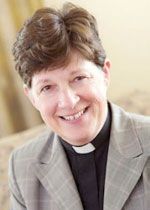“Our Common Witness”
 One of the distinct privileges of this call as presiding bishop is seeing the church at work at home an around the world. The Lutheran movement is alive and well, speaking the gospel in a distinctive voice. Sunday after Sunday the good news is proclaimed in accordance with Scripture and the Lutheran Confessions. In hundreds of languages and dialects, God’s promise of grace, reconciliation and freedom is received and celebrated in places Martin Luther never knew existed. We are part of a worldwide family.
One of the distinct privileges of this call as presiding bishop is seeing the church at work at home an around the world. The Lutheran movement is alive and well, speaking the gospel in a distinctive voice. Sunday after Sunday the good news is proclaimed in accordance with Scripture and the Lutheran Confessions. In hundreds of languages and dialects, God’s promise of grace, reconciliation and freedom is received and celebrated in places Martin Luther never knew existed. We are part of a worldwide family.
In many ways, and in the most important ways, we are alike. The cross is our center. Faith, grace and Scripture alone are our guides. A clear understanding of human brokenness and our inability to save ourselves sets us apart from societal and even some theological pressures that would try to draw us away from the source of our life and freedom. A world built on works and individualism promises salvation based on our own effort and denies salvation if we fail. The Lutheran movement points to another way. This is our common witness.
There are also glorious expressions particular to regions, countries and history: governance; organization; the role of laity, deacons, pastors and bishops; and the age for first communion, to name a few. And that’s just the ELCA! Around the world the expression of Lutheranism takes on many different flavors—literally and figuratively.
In the Northern Diocese of the Evangelical Lutheran Church in Southern Africa, porridge is a staple at all meals, so they pray, “Give us today our daily porridge.” Spiritual healers are an important part of the life and ministry in the Lutheran church in Madagascar. Lutherans in Mexico celebrate the feast day of Our Lady of Guadalupe, which falls just a day away from the Swedish celebration of Santa Lucia. Lutherans around the world hold fast to the core and adapt to make the gospel accessible.
Part of Luther’s genius was to make Scripture, preaching and worship available in the language of the people. All these variations make the Lutheran movement richer, especially when we share across borders and cultures.
Just two years ago we commemorated the 500th anniversary of the Reformation. It was interesting to see the different ways congregations and synods marked the event. Luther roses sprang up everywhere, even on an NCIS episode. There were Luther movies and Luther seminars.
Ecumenical worship services were held, notably with Roman Catholics. I think the Small Catechism made the best-seller list. I can almost imagine a Lutheran Y2K-like montage of celebrations as the sun rose on Oct. 31, 2017, across the globe. If Lutherans are allowed to be proud, we were.
Now it’s time to move forward. It’s good to remember the events of the 16th century, but we shouldn’t get stuck there. We need to ask what it means to be Lutheran in the 21st century. What it means for the Lutheran World Federation’s 148 member churches, representing over 75.5 million members in 99 countries, that are exploring Lutheran identity. For some member churches with a state church tradition—Sweden, for example—Lutheran identity is a novel concept. The Lutheran church was “The Church,” and there was no need to think about identity. Now many churches in Africa and Asia are forging an indigenous expression of what it means to be Lutheran. Yes, they still sing hymns set to German, Swedish and American hymn tunes, but they are also developing music and worship using traditional instruments and styles.
What will our Lutheran identity be in the ELCA? We still treasure our immigrant roots—and we should. But if our ethnic identities become synonymous with Lutheran identity, we are missing the mark. The gospel, and Luther’s clear exposition of it, transcends human boundaries. When a single culture’s vernacular becomes the established language of the people, we hinder the gospel’s free course in the world. We can become an alternative face of Christianity in the culture—one that moves across divisions, is meant for all, and that is a free and liberating gift.
The Rev. Elizabeth A. Eaton
Presiding Bishop
Evangelical Lutheran Church in America


